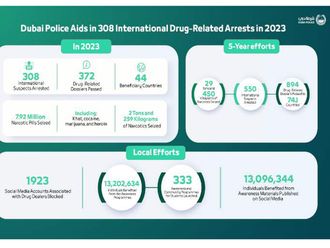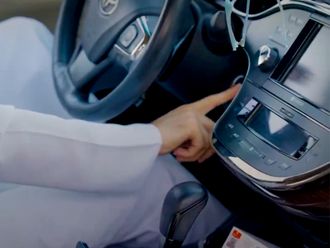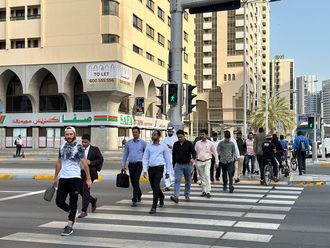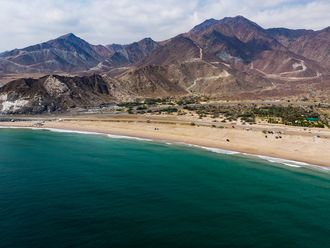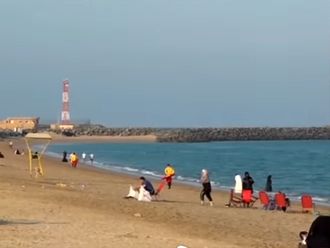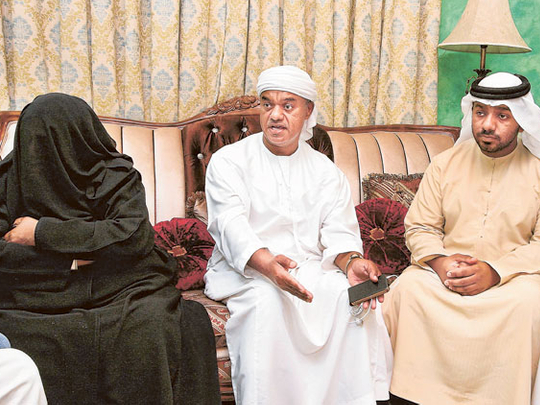
Dubai: For close to six months, the body of little Wudeema lay decomposing in a grave in the desert near the village of Al Fayah, just off the Hatta-Oman road.
Some time between December 2011 and June 2, death’s decay slowly removed the evidence of the tragic life this eight-year-old Emirati girl endured, her living breath tortured from her body at the hands of her father, Hamad S. and his live-in girlfriend, Al Anoud A.
On Wednesday, the Dubai Court of First Instance sentenced the 27-year-old Emirati to death for his role in killing the mild-mannered Wudeema and for torturing and assaulting his other daughter, seven-year-old Meera.
She survived a reign of terror and torture at her father’s hands and implements. His girlfriend, 25-year-old Al Anoud, was sentenced to spend the rest of her life behind bars for helping kill and torture the two girls in her care.
For all of the horrors Wudeema endured, her legacy will live on beyond her years in a law that, on the instructions of His Highness Shaikh Mohammad Bin Rashid Al Maktoum, Vice-President and Prime Minister of the UAE and Ruler of Dubai, will be named after the eight-year-old victim.
“Every child has a right to have a safe life, constant care, and emotional and psychological stability. There will be no leniency with people who violate the rights of children — they are the future,” Shaikh Mohammad said in November when the law was approved by the UAE Cabinet.
But no law could have predicted or prevented the litany of terror Hamad and Al Anoud inflicted on the girls. Both were whipped with electric cords, burnt with cigarette butts and shocked with a Taser-like weapon, locked for hours on end in a closet and left without food — to the point where, in one statement in court, Hamad claimed that his daughters voluntarily ate their own faeces.
Their torture chamber was a small studio apartment in International City where, behind closed doors, the girls were beaten and abused. The cooker in the home also was used as a torture implement.
Hamad’s fall from normalcy into a twisted and criminal lifestyle had been rapid — he lost his government job and was addicted to Tramadol. His first marriage to his wife, Salma, had ended in acrimony in 2006, with their two children becoming pawns in the parental feud.
At their villa in Al Barsha, Hamad’s own parents — Saud, a retired employee of the Department of Foreign Affairs, and his wife Aida — tried to watch out as best they could for their third child and their two granddaughters. They were even made guardians for little Wudeema and Meera.
“But then when the children were sent to live with us, their mother claimed we kidnapped the children and the police took the children back to their mother,” Aida told XPRESS, Gulf News’s sister publication, in June. She added that Salma abandoned Meera outside their house without letting them know.
The custody battle left the children fearful.
“Wudeema begged me not to allow them to be handed back to their father. I let them go because as a grandmother I thought that the girls must go to a school their father chose for them, and because of the court hearing,” the grandmother said Before the girls left, Aida said she had lectured her son: “I told him ‘they are your daughters, treat them with kindness. Girls are not like the boys’.”
The last time Hamad’s wider family saw his children was some time in December, 2011.
As days turned into weeks — and all the while as Wudeema’s body lay in the desert near Al Fayah — Hamad’s relatives were anxious to see the two girls. At Khor Fakkan in March, the family gathered. Hamad was there too, along with Al Anoud — but no girls. When asked, the two said Meera and Wudeema were with their maternal mother, and after the turbulent history, the less said the better.
But the facade was beginning to crack and Hamad, jobless and always looking for the next fix of painkillers, was off the rails. By the end of May, he was under arrest in Fujairah. On Wednesday night, May 30, the family had had enough of wondering and worrying. On Aida’s insistence, Mohammad, Hamad’s eldest brother, went over to the flat in International City.
Beyond the locked door, Mohammad heard Meera inside crying for help. She was alone in the flat.
He phoned Al Anoud. “She told me that everything was fine but refused to come to International City to open the door.”
The hysterical cries of Meera wouldn’t stop. Desperately he tried all the keys he had with him to open the main door. Luckily, one key worked — and luck for Meera too as she had wounds all over her body.
“It was the first time I talked to Meera in many months,” Mohammad recounted, making the instant decision to take his niece to Abu Dhabi where he lives. But it was a journey that would change all forever.
“During the drive, Meera told me that Wudeema was wrapped by her father after she lost consciousness, taken out of the house and never came back,” he said.
He swung his car around, drove to Rashidiya Police station and began to talk.



